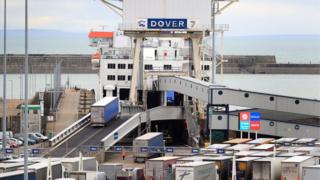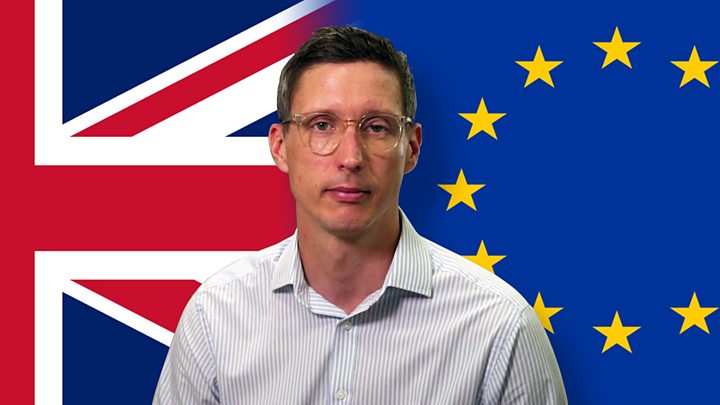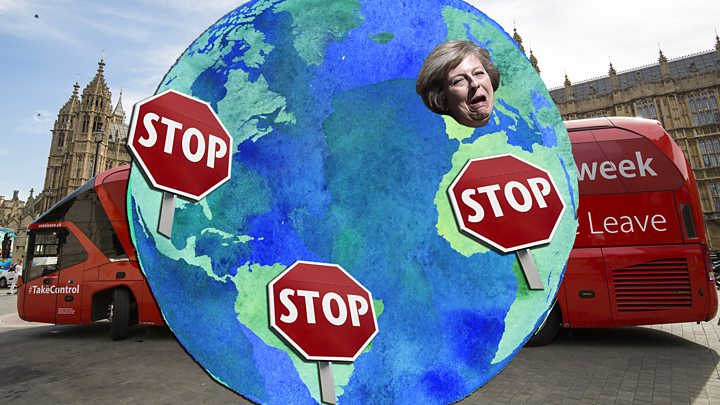 Image copyright
PA Media
Image copyright
PA Media
A £705m funding package to help manage Britain's borders has been announced as the UK prepares to leave the EU customs union at the end of the year.
Plans include new border control posts and 500 extra Border Force staff.
Cabinet Office Minister Michael Gove said the move would help the UK "seize the opportunities" post-Brexit.
Labour has accused the government of complacency in its preparations for the end of the Brexit transition period.
The funding follows a leaked letter from International Trade Secretary Liz Truss raising concerns about the readiness of Britain's ports.
Under the plans, new border posts will be created inland where existing ports have no room to expand to cope with the extra checks that will be required at the existing entry points.
It relates only to the external borders of England, Scotland and Wales. The government is expected to publish specific guidance and measures for Northern Ireland in the coming weeks.
The new funding will include up to £470m to build port and inland infrastructure, and £235m will be allocated for IT systems and staffing.
The money for IT and staffing includes:
£100m to develop HM Revenue and Customs systems to reduce the burden on traders £20m on new equipment £15m towards building new data infrastructure to improve border flow and management £10m to recruit around 500 more Border Force staff.The UK left the EU on 31 January and is now in an 11-month transition period, during which existing trading rules and membership of the customs union and single market apply.
What the UK's relationship with the EU will look like when the transition period ends will depend on whether a trade deal is reached.
Customs checks on EU goods will be delayed until July 2021.

Media playback is unsupported on your device
It comes after a leaked letter, first reported by Business Insider, suggested Ms Truss had expressed concerns about the government's plans to phase in checks on EU goods coming into the UK after the Brexit transition period.
Ms Truss reportedly warned fellow ministers that failing to impose full border controls until July could see increased smuggling from the EU, lead to legal challenges at the World Trade Organization, and even weaken the union with Northern Ireland.
The UK government has ruled out extending the transition period in order to reach a deal.
Mr Gove said: "With or without further agreement with the EU, this £705m will ensure that the necessary infrastructure, tech and border personnel are in place so that our traders and the border industry are able to manage the changes and seize the opportunities as we lay the foundations for the world's most effective and secure border."
Former national security adviser Lord Ricketts responded on Twitter to Mr Gove's comments. "It's not clear to me how we will have 'the world's most effective and secure border' (Mr Gove) when we will lose access on 1 Jan to the Schengen Information System which gives alerts on movement of criminals/suspects," he said.
He added that UK police and border staff consulted the shared Schengen system 600 million times last year.

Media playback is unsupported on your device
Labour shadow minister Rachel Reeves said the measures were "too little, too late", while the new Irish Taoiseach, Micheál Martin, told the BBC's Andrew Marr that his country does not yet have all the information it needs about the Irish border arrangements.
"We do need more details, we need more precision," he said. "I think we need an injection of momentum into the overall talks between the European Union and United Kingdom in relation to Brexit."
He said although he believes progress towards a trade deal has been slow, he added: "I believe that if there's a will there's a way in terms of resolving outstanding issues."
"I think there will be a deal, there has to be a deal," he said, but added: It can't be at any price."
Immigration plans
Writing in the Sunday Telegraph, Mr Gove also said the government will introduce a migration policy "that ensures we're open to the world's best talent".
The government is planning a points-based immigration system which treats EU migrants the same as those from the rest of the world and which takes different factors like skills and language into account when awarding visas allowing people to work in the UK.
Mr Gove said: "And the new technology we're introducing will allow us to monitor with far greater precision exactly who, and what, is coming in and out of the country, enabling us to deal more effectively with organised crime and other security threats."
More details on the plans for the immigration system will be revealed on Monday.
Writing in the Sun on Sunday, Home Secretary Priti Patel said: "We will scrap the bureaucratic Resident Labour Market Test, lower the skills and salary threshold and remove the cap on skilled workers."
The so-called "resident labour market test" only allows companies to recruit new workers from outside the EU if they are on the shortage list or if they have been unable to find anyone suitable after advertising in the UK.
"Our new Health and Care Visa will ensure the NHS continues to benefit from the outstanding health and care professionals who have kept this country on its feet throughout the pandemic," Ms Patel added.
And she said "a new graduate route will ensure international students can stay in the country once they have completed their studies".

 5 years ago
608
5 years ago
608 

